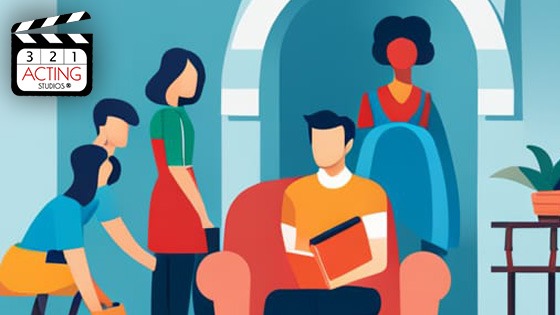
01 Jun Active Listening: Why Reactions Matter Most
Did you know that one of the best gifts you can give to a director and editor is a strong take of you in a state of connected, active listening? You don’t need all of the lines to make an impact. Here are some reasons to make sure you are always in a state of active listening while filming on set.
Your reactions are powerful.
As we are sure you’ve noticed, some of the most powerful moments in film are wordless. On stage, we communicate with broad movements and gestures. On film, we convey story and emotions through our eyes. Check out some of our advanced students from 3-2-1- acting studios in the video for reference; though they are not saying many words, they are certainly making an impact with their powerful reactions.
Reactions bring out the comedy!
This video showcases more dramatic scenes, but reactions are equally as important when it comes to comedic acting. In classic comedy shows, there is often a “wacky” comedic character juxtaposed next to what is known as a “deadpan” comedic character – who seemingly lacks a sense of humor. But what makes the wacky character funny…is the other character’s deadpan response! Check out any episode of Friends, for example, and pay close attention to all of the characters’ reactions to one another.
As an active listener, you make the editor’s job easier.
In our recent post about acting continuity, we talked about making an editor’s job easier by tracking your blocking, props and wardrobe details on set. Well, if you are a great active listener – and provide some fantastic reactions in your coverage – guess what? You might be an actor that “saves the scene.” As you know, filmmaking is an imperfect process. Sometimes, the director and editor will run into continuity issues in the editing room. They may have footage of an actor speaking a line that lacks continuity or that simply doesn’t work. To fix this problem, they can cut to strong reaction shots – ideally, of you.
Your reaction shots can be used in different parts of the scene.
No matter how small you deem your part to be – and remember, there are no small parts – it is important that you always remain “on” and connected to what is happening around you, even if you deem yourself a peripheral character. Again, strong reaction shots are absolutely gold in the editing room. Your reaction to one moment – something that you may not even realize was caught on camera – might even be used later in the scene, to make a different moment more seamless or entertaining.
Learn in an acting class!
The best way to become great at listening and racing, of course, is to train and practice. Improv training will help you to sharpen your instincts and, of course, it’s important to enroll in a fantastic scene study class. We offer acting classes for kids, teens, and adults in Los Angeles – and online to students around the world!



